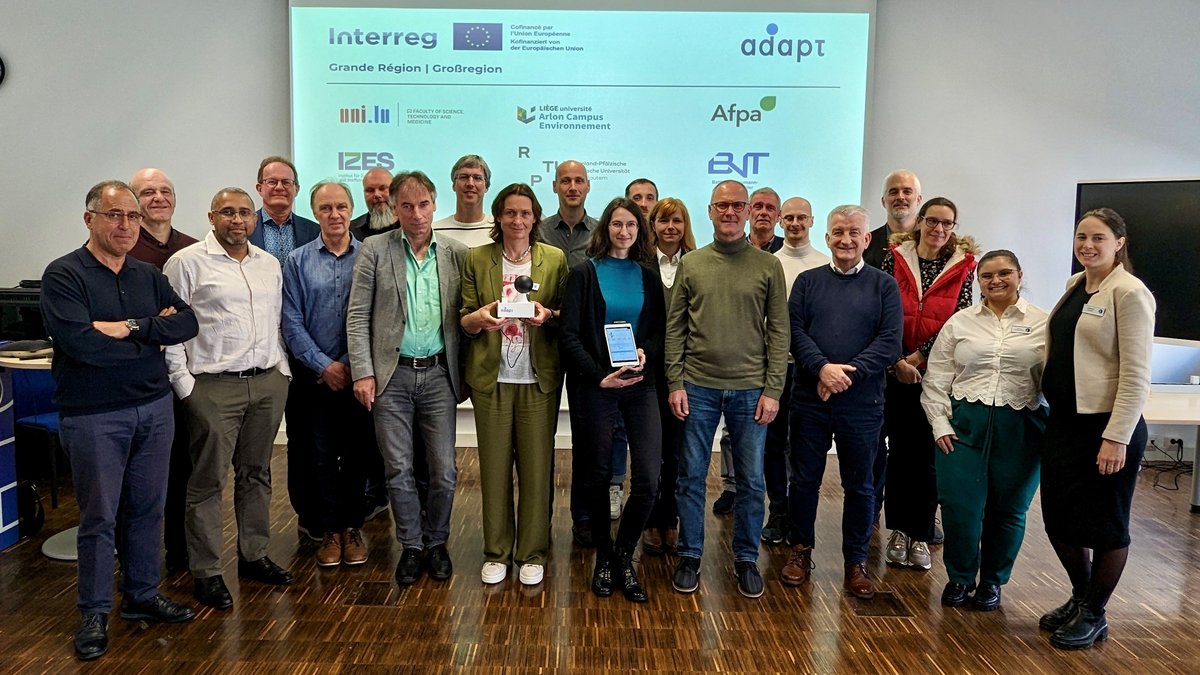ADAPT
A project for climate change adaptation in the larger region.

The ADAPT project (Overheating and Heat Stress – Mitigation and Adaptation Strategies) is an initiative within the Interreg program for the larger region that addresses the impacts of climate change on building structures and the health of particularly vulnerable individuals. Given the increasing frequency and intensity of heatwaves in recent years, it is becoming ever more important to develop innovative solutions to minimize the effects on vulnerable groups such as the elderly, sick, or dependent individuals. The ADAPT project focuses precisely on this: it is developing a monitoring system aimed at making life in buildings more climate-friendly and safer.
What is the goal of the project?
The goal of ADAPT is to establish an early warning system for heat-related health risks and adapt buildings to the challenges of climate change. The monitoring system developed within this project measures critical indoor data in real time, such as temperature, humidity, and radiant temperature. This system will be installed especially in facilities where vulnerable individuals are present, such as nursing homes, kindergartens, or healthcare facilities. The system sends the collected data directly to a central platform that analyzes the information. If a set threshold is exceeded, users immediately receive an alarm message through an app, along with specific recommendations for action to protect against heat stress. This allows for preventive measures to be taken before health problems arise. The early warning system is particularly important for the larger region.
Who are the partners of the project?
The ADAPT project is supported by a variety of partners from different sectors. The lead partner is the Rhineland-Palatinate Technical University Kaiserslautern-Landau, specifically the Department of Building Systems and Building Technology. The university plays a key role in developing technological solutions and providing scientific support for the project. Other significant academic partners include the University of Luxembourg, the University of Liège, and the University of Lorraine.
- Financial Partners
- Rhineland-Palatinate Technical University Kaiserslautern-Landau – Department of Building Systems and Building Technology (Lead Partner)
- Université de Liège
- University of Luxembourg
- Université de Lorraine
- Afpa – National Agency for Adult Vocational Training
- IZES gGmbH
- Trier-Saarburg District
- Strategic Partners
- Catholic Daycare Center St. Franziskus Urexweiler
- Ambulant Nursing Service Manuela Kirsch GmbH
- Viessmann Luxembourg
- Wallonie Bois – Competence Center
- Bouygues Bâtiment Nord Est
- Energy Agency Rhineland-Palatinate
- Sankt Wendel District
- Institute for Sectoral Training in Building
- Centre Hospitalier du Nord Ettelbruck – Pneumology Group
- Nursing and Care Home – Résidence de la Knippchen
- ATMO GrandEst
- A.E.I.M Specialized Care Home
- Bauforum Rhineland-Palatinate
- Ministry for Environment, Climate, Mobility, Agriculture, and Consumer Protection of Saarland
- Ecumenical Community Work Pfalz GmbH
What will be done as part of the project?
The project includes several work packages that focus on different aspects of the solution. A central component of the project is the development and setup of the so-called CoMoS (Comfort Monitoring Stations). These monitoring stations will be installed in various facilities across the larger region and will continuously measure key indoor climate data. The stations will collect data on air temperature, radiant temperature, humidity, and air velocity, which will be transmitted in real-time to a central data platform.
After data analysis, a warning will be triggered if the conditions in a room become dangerous for the people present. In the first phase of the project, a workshop will be held to provide project partners with the necessary expertise for building the monitoring stations. The goal is to install about 50 of these stations in facilities throughout the larger region by the end of the project.
Another important part of the project is the development of a mobile app that will allow users to receive alarm messages and recommendations for actions to mitigate heat stress. This app will be developed as part of work package 5 and will enable direct communication with the affected individuals.
In addition to the technical implementation, the project will involve extensive public outreach, including information events, workshops, and training sessions for professionals and the general public, to raise awareness about climate change and its associated health risks.